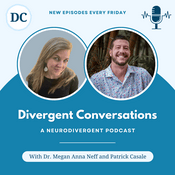Neurodivergent individuals often find mental health topics like OCD, autism, and ADHD intertwined in ways that can complicate their personal narratives and self-identity.
In this flashback episode, Patrick Casale and Dr. Megan Anna Neff, two AuDHD mental health professionals, discuss with Brittany Goff, an LCSW, the Clinical Director at Zen Psychological Center, and an instructor at the Cognitive Behavioral Institute, about the critical intersections of OCD, autism, and ADHD, their impact on well-being, and the use of I-CBT in the treatment of OCD for neurodivergent individuals.
Top 3 reasons to listen to the entire episode:
Understand how sensory discrepancies can lead to the development of obsessive stories, particularly for autistic individuals, and how inference-based cognitive-behavioral therapy (I-CBT) offers a tailored approach to counteract these doubts.
Discover the unique challenges and strategies for neurodivergent individuals, including those with undiagnosed autism or ADHD, in managing OCD symptoms and building self-trust through a neuro-affirmative lens.
Learn about the intersection of personal experiences, vulnerable self-themes, and logical reasoning with OCD, and how neurodivergent traits such as hyperempathy and rejection sensitivity influence the creation of obsessive narratives.
As you reflect on this episode, consider how your sensory experiences and neurodivergent traits affect your perception of reality and self-trust, as well as how I-CBT can offer tools and strategies to foster a stronger sense of certainty and understanding in your daily life.
DISCLAIMER: I-CBT is currently only evidence-based for OCD.
More about Brittany:
Brittany Goff is a Licensed Clinical Social Worker and the Clinical Director at Zen Psychological Center, a neuroaffirming OCD practice in Maryland. Additionally, she serves as an Instructor at the Cognitive Behavioral Institute, where she provides continuing education in Inference-based Cognitive Behavioral Therapy (I-CBT) for OCD. She authored the first-ever I-CBT workbook and was one of the first adopters of I-CBT in the United States. She is the first clinician to offer I-CBT training specifically tailored for individuals with Autism and ADHD, a neuroaffirming approach to treating OCD.
For those wanting to learn more about Inference-based, Cognitive Behavioral Therapy, visit the following two Facebook groups:
I-CBT & Neurodivergence: For licensed therapists, graduate students, researchers, and occupational therapists to discuss the application of I-CBT. Free Resources will be shared for use with clients.
I-CBT & Neurodivergence Community: A supportive space for all individuals to connect and share experiences. Free resources, games, and worksheets are accessible to those wanting to apply I-CBT with the help of an I-CBT provider.
If you’re interested in deepening your understanding, you can find Brittany Goff’s I-CBT training below, which focuses on resolving the OCD doubt. This fidelity of the model helps you teach your clients how to break free from the obsessive thinking patterns that create convincing narratives of doubt.
Trainings in I-CBT: icbtonlinelearning.com
If you are interested in learning how to adapt I-CBT for neurodivergence join the waitlist here and you will be notified when the training is released:



